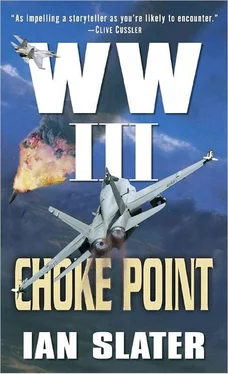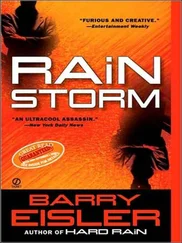Circumventing the floating kelp bed, Choir almost ran aground on a sandbar. Along the shoreline, an army of wine-dark kelp crabs moved en masse, ready to swarm any detritus trapped by the kelp. It was one of the ugliest things Choir had ever seen.
Choir was right. Dixon was in the cave. There were no distinctive footprints to guide the SpecFor team. The sandy apron below the cave had obviously been “Main Street,” as the team habitually referred to the main trail or thoroughfare used by the enemy — in this case, by the terrorists to hurriedly replenish the sub. Dixon’s eyes widened when he saw Choir, who had followed the speckled trail of blood from the beach, and his intake of air made an annoying, laborious sound, as if he were inhaling through straw. What neither Choir nor his three comrades had seen in the cave’s dripping gloom was the duct tape across Dixon’s mouth, which they now saw while approaching.
“This’ll hurt, boyo!” Choir told him as the Welshman, resting his HK against the nearby boulder, knelt down to unbind Dixon. Freeman, Aussie, and Salvini, as if by instinct rather than training, formed a protective C around them.
“Mother of God!” It was Choir, in shock, realizing that Dixon’s strained breath had been his last, that the damp sand the Welshman was kneeling in was wet with blood. “Boys,” Choir said softly in a tone of a sadness that physically seemed heavier than his pack.
“What’s up?” asked Aussie, eyes still to the front. There was no answer from Choir, and Aussie glanced back, froze, then looked away — at anything rather than the young swimmer whose mouth had been stuffed with what remained of his blood-sodden genitals.
He had choked to death. Aussie, who would later chastise himself for his morbid curiosity — or had it been the simple human need to confirm what he thought he’d seen? — looked down in the gloom at the dead man’s groin area. Jesus … Dixon’s corpse voided, the stench vile. Even Freeman, who’d seen his share of death, felt as if he would throw up. But as usual, he maintained command and control of himself, and before he gave any order to the others, turned and, steeling himself, went over to the dead American, and took off the warrior’s dog tags. “Sal, you and Aussie wrap him up. Place him on one of the beach fires. No one should see their loved one like this.”
Sal, being Catholic, had an aversion to cremation, and funeral pyres in particular, but right here, right now, he agreed with the other three.
“Those bastards!” said Aussie. “That’s pure evil.”
No one disagreed, and as Freeman led them in a short prayer, they piled the fire with any other wood they could find from what had obviously been torpedo crates.
For several minutes afterward no one spoke, each counseled by his own thoughts as they desultorily checked the splintered wood on the pyre. But each of the four were ready to exact revenge. The general was standing at the water’s edge, listening. He heard no sound of ships moving or the earlier chopper. He looked up into the gray sky and saw and heard nothing but the continuing roar of the bisected falls in front of them.
“Sal, you and Choir stay by the boat,” he finally said, breaking the silence. “Whoever was here has probably gone by now, but keep a sharp eye. Aussie, you and I’ll recon the beach.”
Halfway along the rock and crushed-shell shore, Freeman stopped several times to stare up into the fog and around the bay.
“Hear something, General?” asked Aussie, whose tone still conveyed his anger over what had happened to young Dixon.
“No,” answered the general, and stopped walking. “You ever been to San Francisco?”
“One summer,” answered Aussie, his dark mood momentarily arrested by Freeman’s inquiring tone, a giveaway to those who had fought with him that he was mentally flicking through the thumb-worn codes, the precomputer card index files that held his vast repository of what sometimes seemed to others useless and unrelated information.
“I lived down by the bay for a few years,” Freeman continued. “Sometimes the fog would come in like this, roll in and lie there for hours in a layer right across the bay. It was so layered you could drive right over it on the bridge.”
“Well, General, there’s no bridge here we can drive — oh, you mean the fog mightn’t be as high as we think.”
Freeman had turned around, craning his neck to look up at the dark-green-sheathed cliff face, veiled in an ever-changing curtain of fog and fire smoke. A lost world, a remote enough part of America in normal times, but now even more so as a result of the panicky evacuation of entire populations in the Northwest to all points south. Fog, cold and lonely. “See that line, kind of an S shape about eleven o’clock?”
Aussie looked to the left and saw the trail winding up the eastern end of the cliff, away from the falls and about two hundred feet east of where the Little Bird had come down, pieces of its tail rotor assembly faintly visible in the ghostly fog that rolled down over the cliff face.
“You want me to have a go?” said Aussie.
“I’ll go,” Freeman said.
“Ah, I’m still stiff as a prick from crouching in that damn tin boat. I could do with a stretch.”
“Think I’m past it?” Freeman said challengingly. “I can still press two hundred and—”
“Hell, General, you’re in better shape than anyone here.” It was close to the truth. “Like I said, I need the stretch.”
“Very well. Watch for mines, though I would think the last thing the terrorists would do is plant mines around — have some wild goat wandering about, getting blown up and drawing attention to the place.”
Aussie took off his pack, tightened the HK’s sling on his back, and put on his gloves.
Freeman glanced at his watch. “Thirty minutes?”
“Thirty minutes,” confirmed Lewis, and set off.
The last he saw of the general, the legend was busy, one hand on his hip, the other directing a steaming thin stream into the kelp.
Charles Riser awoke from his Zopiclone-induced sleep to the nerve-slicing screams of children, the Boeing Jumbo having plunged two hundred feet in the worst turbulence the airline’s pilots had experienced in a decade of carrying passengers over the Pacific. Riser felt faintly queasy, but in his semisomnolent state he truly didn’t care whether the aircraft crashed. Death would be virtually instantaneous, and a shutter would slam down on the window of his grief- and hate-filled life. He knew he never used to hate like this, and he despised himself for it. He’d had always taken the high road, the one supposedly traveled by the cultured, educated elite who disdained the vulgarity and eschewed the banalities of the masses, for whom an eye for an eye was the guiding principle of justice, for whom rehabilitation of criminals was despised as the philosophy of effete academics who worked in tenured castles and lived on the safer side of town. It was a shock for Charles to discover that he was at one with the masses in the matter of murder.
The seat belt signs stayed on for the remainder of the flight to Seattle, some parents complaining that the CNN newscasts of the terrible situation in the U.S. Northwest should not be shown.
“We can’t censor the news,” the plane’s purser told one of the angry mothers. “We just bring in the signals.”
“Then send them back.”
“Ma’am, some of the other passengers want to see it. They have loved ones in the Northwest. Besides, all you have to do is change channels or turn it off.”
“It’s no good turning it off,” retorted the woman. “The children can see it on all the other screens in the plane.”
“There’s a cartoon channel.”
Читать дальше












